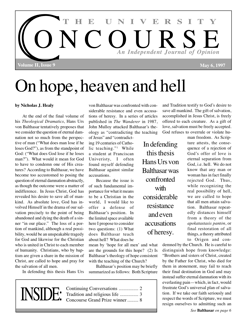Why ‘charismatic spirituality’ belongs at the heart of our communal life
by Kathleen van Schaijik
Though he obviously tried to be fair in his article on charismatics, traditionalists and the liturgy, and though he says he used to be a charismatic himself, I cannot help thinking that Adam Tate must not really understand what the renewal is all about.
The charismatic renewal is not a private spirituality developed by men as a means of expressing their faith. Rather, it is mainly something God has done—a grace He has poured out in order to renew His Church. It is, first and foremost, an inward grace: a gratuitous, overpowering and very intimate certitude of God’s presence, His love and His saving power, which is often (but not always) accompanied by extraordinary spiritual gifts, such as those that appeared among the early Christians after Pentecost.
For at least two or three recent decades, this grace has been offered in gigantic measure and on a gigantic scale to practically anyone who showed himself willing to receive it. And, in this way, the personal renewal of untold thousands became a sort of informal “movement” in the Church. Those who shared the experience naturally began to congregate together, in places where they could freely express their jubilation, exercise their “gifts,” and live our their new faith without reserve. Steubenville became one of those places.
But Franciscan University was not only a place where the charismatic river of life could flow freely, so to speak, but also a place where its characteristic unruliness could be channeled and harnessed; made to stay inside the safe banks of orthodoxy and Catholic tradition; kept from flooding and destroying otherwise fertile ground. In my opinion, this is one of the most obvious of divine purposes for our campus: that it be a place where the astonishing power of the charismatic renewal can be matured through the life of the mind and chastened by the disciplines of Mother Church, in a way that multiplies it’s fruitfulness by pruning its “luxuriance.”
This is not to say that everyone at Franciscan University ought to be a card-carrying member of the charismatic renewal, nor that unless they are, they are not living a full life in the Spirit. Nor does it necessarily mean that all our services ought to be conspicuously charismatic in style. But it does mean that to deliberately suppress the renewal, or to banish every expression of it (as Adam Tate proposes) from the liturgies, which are the heart of our communal life, could amount to a rejection of a divine gift, and a betrayal of the specific mission of our University.
Of course, part of the right “disciplining” of the renewal might include keeping certain of its manifestations out of the liturgy for various reasons, either doctrinal or prudential, and it would be stubbornness on the part of “charismatics” if they refused to listen to legitimate concerns about distractions or unfitting behavior or unworthy music at our liturgies. But this sort healthy “pruning” and perfecting of our liturgical life is something different from a wholesale prohibition against the expression of charismatic spirituality at Mass. Particular behaviors may be duly criticized, but a gift from God should be carefully cherished.
Kathleen (Healy) van Schaijik, Class of ‘88


